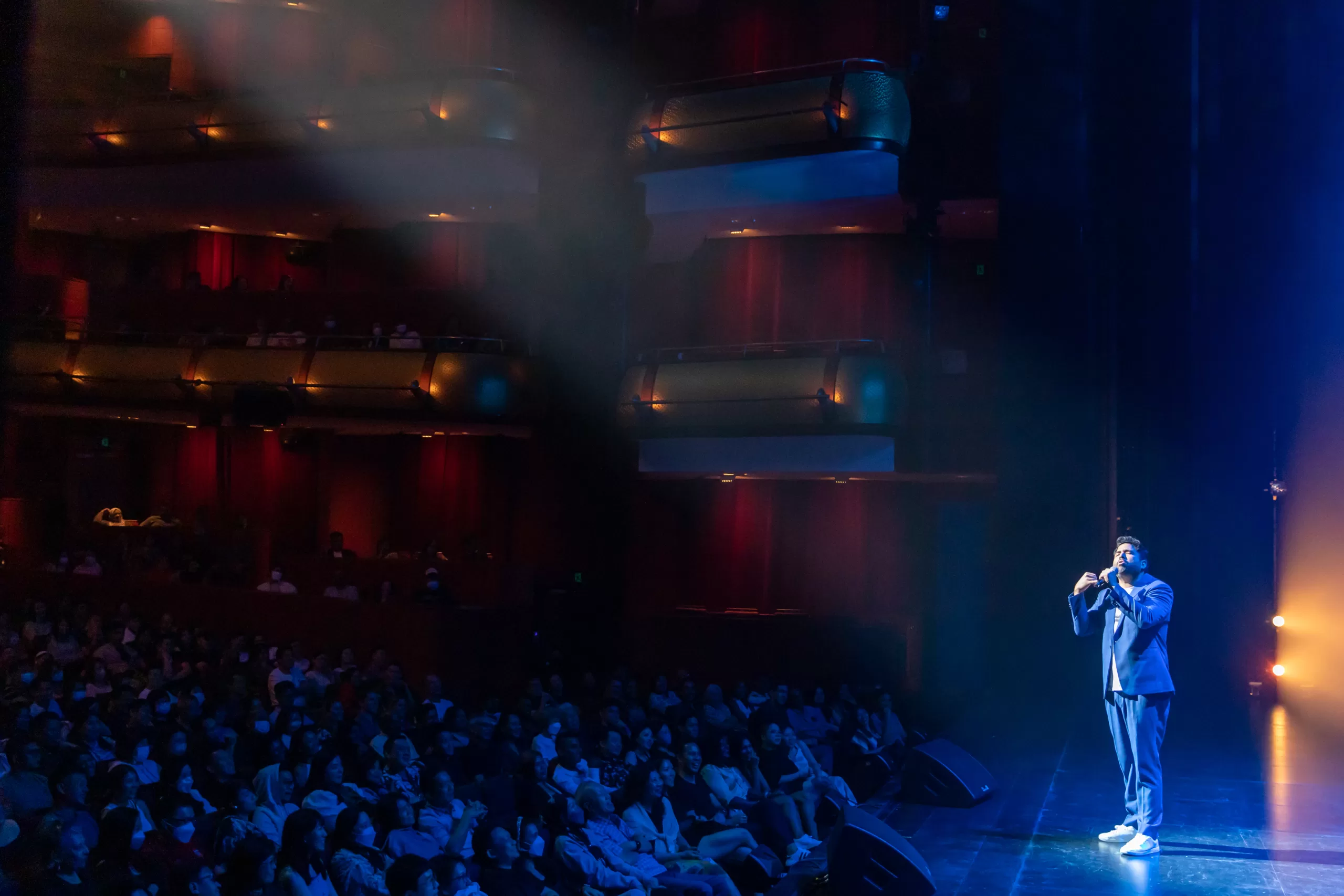If Rizal van Geyzel’s life has felt like a comedic farce recently, it’s best physically exemplified by the black paint that was splattered not across the door of his comedy club, but of the bank next door.
“They vandalised the wrong door! The bank’s CCTV picked it up. If you are going to throw paint over a door, at least pick the right one,” he laughs.
Van Geyzel is a Malaysian comedian who was the co-owner of the now closed Crackhouse Comedy Club in Kuala Lumpur, the site of the intended paint job. Days before the protest in July 2022, old clips of his stand-up were uploaded onto social media, a move which landed him in court, changed his life and inspired his recent show, Arrested.
“There were three videos overall. In one, I made a joke that despite having a Chinese father, I am what you would call a “privileged Malaysian”, those with government benefits usually entitled to people born to Malay heritage, which I also am.”
These videos were then investigated by police, and van Geyzel was arrested on suspicion of sedition. Spending the night in a jail, he quickly found himself hauled into Kuala Lumpur’s Cyber Crime Court, where sedition was replaced with charges under Section 233 of the Communications and Multimedia Act 1998. The act criminalises “improper use of network facilities or network services” and can result in a maximum fine of 50,000 Malaysian ringgits ($10,000) or imprisonment, or both. He plead not guilty to all charges and was allowed bail set at 12,000 ringgits ($2,500) with one surety.
“It was such a hassle. It was hard because comedy is my sole income. I’m a single father, and my father was clinically ill,” van Geyzel said. His passport was taken by the court, which he had to request if he had shows in other countries.
After a court mix up, further indicative of the farce-like element of his experience, he was also banned from social media for three months. “The judge said I just couldn’t post anything about the ongoing case, but the official court documents stated I couldn’t post on social media period. It took three months to resolve,” he said.
Looking for positives though, van Geyzel laughs about the ban: “I have to say, not going online then was a peaceful time in my life!”
Section 233 of the Communications and Multimedia Act 1998 has its critics, who believe it’s being used to target writers, performers and the public in general for expressing their views on social media and in the press. Making it an offence to create ‘offensive’ material that could make its way online and ‘annoy’ viewers means the act is too open to interpretation, according to the Malaysian writer, poet, and former President of PEN Malaysia, Bernice Chauly.
She said: “It is so broad that any Malaysian can make a police report because they are ‘annoyed’, regardless of whether they are the intended recipient. There is no legal definition of what ‘annoyed’ means.
“It is very disturbing that this provision is being used to silence dissenting voices in a punitive manner…and to target writers and others whose views are critical of those in power.”
Van Geyzel doesn’t speak about the act directly, but believes it’s had a negative effect on the comedy circuit in the country. While he feels comedians in Malaysia are comfortable making jokes about themes such as religious and race issues within the confines of a comedy club, the problem is when people start to record on mobile phones.
“The only paranoia or danger we should feel is what is put online,” he said. “People like to record and post on social media during a show, and this is where it gets dangerous because you don’t know which part they are recording. Fellow comedians will ask what we think about each other’s routines, because things can so easily be taken out of context.”
In July 2023, van Geyzel pleaded guilty to one charge of Section 233 of the Communications and Multimedia Act 1998, for the “privileged Malaysian” joke, and was fined 8,000 ringgits ($1,700). As a result, he faced no conviction record and no further court proceedings.
Why did he plead guilty if he thinks he did nothing wrong?
“I had to view it as a very expensive parking ticket as I couldn’t deal with the court proceedings anymore, and I faced no criminal record. I also wanted my passport to be free!”
Van Geyzel took the positives from his experience and decided to tell his story in a new stand-up show. Arrested is performed around Malaysia, and in August ran at the Edinburgh Fringe Festival where he enjoyed anonymity as a performer, unlike at home.
“In Edinburgh people had no idea of the situation, so I could easily talk about my comedy club being shut down, vandalised, how I was investigated for sedition, then picked up by the coppers, put in lockup for a night and had charges in court, all for jokes that appeared online.
“But then I also talked about how my government perceives stand-up comedy to be a dysfunctional Western import, you know, like democracy, and how easy it is for comedy and freedom of speech to come under attack. It does sound very heavy, but it is a fun show. “Come see how I got arrested for comedy!””
Van Geyzel’s case was so prominent in comedic circles that other comedians under fire for jokes contacted him for advice such as Jocelyn Chia, a Singaporean American comedian. She was heavily criticised online after a video went viral featuring a joke about Singaporean and Malaysian relations, as well as the missing Malaysia Airlines Flight 370. What did van Geyzel say to Chia?
“She asked if she should apologise. Despite what happened to me I said don’t, wait it out, in a few days people will move on to the next thing. Though I have a friend who ‘liked’ the video Chia was in, and he then got heavily abused online.
“When it comes to stand-up you should be able to joke about whatever you want, it’s proper freedom of speech. Unfortunately, though, once it’s online it’s out of your hands.”
For more articles about comedy and comedians under attack, read our new issue Having the last laugh here






